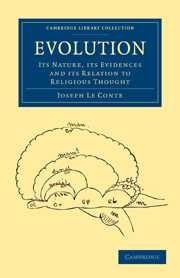Book contents
- Frontmatter
- PREFACE TO THE SECOND EDITION
- PREFACE TO THE FIRST EDITION
- Contents
- PART I WHAT IS EVOLUTION?
- PART II EVIDENCES OF THE TRUTH OF EVOLUTION
- PART III THE RELATION OF EVOLUTION TO RELIGIOUS THOUGHT
- CHAPTER I INTRODUCTORY
- CHAPTER II THE RELATION OF EVOLUTION TO MATERIALISM
- CHAPTER III THE RELATION OF GOD TO NATURE
- CHAPTER IV THE RELATION OF MAN TO NATURE
- CHAPTER V THE RELATION OF GOD TO MAN
- CHAPTER VI THE OBJECTION THAT THE ABOVE VIEW IMPLIES PANTHEISM, ANSWERED
- CHAPTER VII SOME LOGICAL CONSEQUENCES OF THE DOCTRINE OF THE DIVINE IMMANENCY
- CHAPTER VIII RELATION OF EVOLUTION TO THE IDEA OF THE CHRIST
- CHAPTER IX THE RELATION OF EVOLUTION TO THE PROBLEM OF EVIL
- Index
CHAPTER V - THE RELATION OF GOD TO MAN
Published online by Cambridge University Press: 29 August 2010
- Frontmatter
- PREFACE TO THE SECOND EDITION
- PREFACE TO THE FIRST EDITION
- Contents
- PART I WHAT IS EVOLUTION?
- PART II EVIDENCES OF THE TRUTH OF EVOLUTION
- PART III THE RELATION OF EVOLUTION TO RELIGIOUS THOUGHT
- CHAPTER I INTRODUCTORY
- CHAPTER II THE RELATION OF EVOLUTION TO MATERIALISM
- CHAPTER III THE RELATION OF GOD TO NATURE
- CHAPTER IV THE RELATION OF MAN TO NATURE
- CHAPTER V THE RELATION OF GOD TO MAN
- CHAPTER VI THE OBJECTION THAT THE ABOVE VIEW IMPLIES PANTHEISM, ANSWERED
- CHAPTER VII SOME LOGICAL CONSEQUENCES OF THE DOCTRINE OF THE DIVINE IMMANENCY
- CHAPTER VIII RELATION OF EVOLUTION TO THE IDEA OF THE CHRIST
- CHAPTER IX THE RELATION OF EVOLUTION TO THE PROBLEM OF EVIL
- Index
Summary
In the two preceding chapters we have discussed the relation of God to Nature and of man to Nature. There is still another relation, if possible, of still more vital importance to us, viz., the relation of God to man. This, of course, introduces the question of revelation—a subject which I approach with some reluctance. I feel I am treading on holy ground, and must do so with shoes removed. If it be asked, How is evolution concerned with the subject of revelation? I answer Evolution emphasizes and enforces the reign of law taught by all science, and makes it at last universal. Many conclude, therefore, that, if evolution be true, a belief in the possibility of any form of revelation is irrational. I do not think this follows, and I will give my reasons. I do so, however, very briefly, because we are not yet ready to formulate our views except in the most general way.
If man be indeed something more than a higher species of animal; if man's spirit be indeed a spark of Divine energy individuated to the point of self-consciousness and recognition of his relation to God; if spirit-embryo, developing in the womb of Nature through all geological time, came to birth and independent spirit-life in man, and thus man alone is a child of God as well as a product of Nature—if all this be true, then it is evident that this wholly new relation requires also a wholly different mode of Divine operation.
- Type
- Chapter
- Information
- EvolutionIts Nature, its Evidences and its Relation to Religious Thought, pp. 331 - 334Publisher: Cambridge University PressPrint publication year: 2009First published in: 1898



